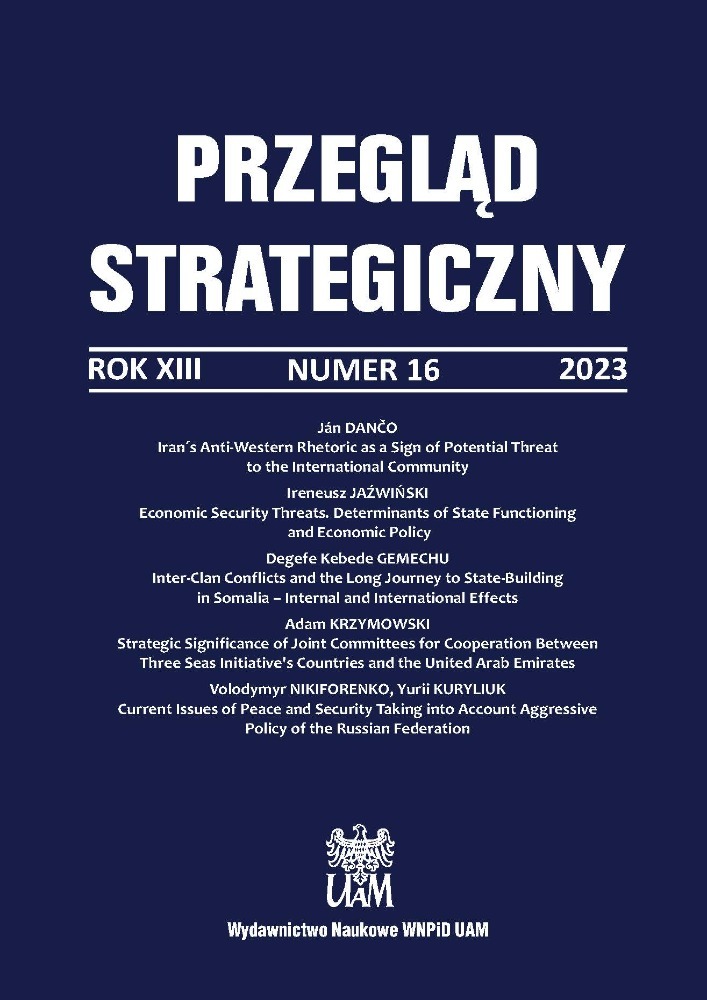Abstract
The aim of the present article is to analyse the efforts taken aimed to build the security of the region as part of Lithuanian foreign policy in the international arena in the era of the Russian invasion of Ukraine. This article seeks to verify the hypothesis that small states are able to set in motion a process that can benefit the entire region, and thus they may contribute to building international peace and security. The theoretical basis of the research is post-structural theory, from its perspective Lithuania accepts and actively shapes its identity as a small state, which is defined primarily in relation to its large and dangerous neighbor. This helps explain the small country’s consistent pursuit of integration and being an active player in the international arena, which was supposed to help it break away from the Soviet past and “return to the West.” Thus, this study contributes to knowledge on the practice of international relations by reflecting on the growing role of the Baltic States.
References
CNN (2022), Russia shuts off gas supplies to Poland and Bulgaria, CNN, April 27th, 2022, https://www.cnn.com/2022/04/26/energy/poland-russia-gas/index.html.
Eurostat (2022), Energy imports dependency, https://ec.europa.eu/eurostat/databrowser/view/NRG_IND_ID__custom_2070352/bookmark/table?lang=en&bookmarkId=10efc154-dea6-494c-9867-a3f877a4703c.
Department of Statistics to the Government, Statistical Yearbook of Lithuania, Annual, Economic and Social Development in, Monthly.
Dudzińska K. (2022), Litwa wobec rosyjskiej agresji na Ukrainę, “Komentarz PISM”, No. 57.
EESC (2020), Rytų Partnerystė Ir Lietuva: Silpnybės, Stiprybės Ir Atviros Galimybės, Rytų Europos Studijų Centras, Vilnius, https://www.eesc.lt/wp-content/uploads/2022/09/eesc-tyrimas-rytu-partneryste-ir-lietuva.pdf.
Gritėnas T. (2017), Lietuvos ir Estijos santykiai: nuo išvadinimo kvailiais iki bendrų grėsmių ir sprendimų, https://www.15min.lt/naujiena/aktualu/pasaulis/lietuvos-ir-estijos-santykiai-bendros-problemos-bet-skirtingi-iprociai-57-808950.
Kojala L., Ivanauskas V. (2015), Lithuanian Eastern Policy 2004–2014: The Role Theory Approach, “Lithuanian Foreign Policy Review”, No. 32: 49–72.
Kuczyńska-Zonik A. (2022), Wpływy rosyjskich oligarchów w państwach bałtyckich, Komentarze Instytut Europy Środkowej, No. 622(134/2022).
Lietuvos Respublikos užsienio reikalų ministerija (2022), Tarptautinių sankcijų įgyvendinimas, November 14 th, 2022, https://www.urm.lt/sankcijos.
LRT (2015a), Floating LNG terminal “Independence” sails into Klaipėda, LRT – Lithuanian National Radio and Television, September 8th, 2015, https://www.lrt.lt/en/news-in-english/19/73829/floating-lng-terminal-independence-sails-into-klaipeda.
LRT (2015b), Baltic leaders welcome Lithuania’s “Independence” as energy security guarantee for all region, LRT – Lithuanian National Radio and Television, September 8th, 2015, https://www.lrt.lt/en/news-in-english/19/74087/baltic-leaders-welcome-lithuania-s-independence-as-energy-security-guarantee-for-all-region.
LRT (2022a), Lithuania would help supply gas to Poland following Gazprom’s halt, minister says. LRT- Lithuanian National Radio and Television, April 27th, 2022, https://www.lrt.lt/en/news-in-english/19/1682289/lithuania-would-help-supply-gas-to-poland-following-gazprom-s-halt-minister-says.
LRT (2022c), Madridas pakeitė NATO veidą: Lietuvos kišenėje diplomatinė pergalė, bet pasauliui gresia skilimas – ar grįžta Šaltojo karo laikai?, July 2th, 2022, https://www.lrt.lt/naujienos/lietuvoje/2/1731560/madridas-pakeite-nato-veida-lietuvos-kiseneje-diplomatine-pergale-bet-pasauliui-gresia-skilimas-ar-grizta-saltojo-karo-laikai.
Malużinas M. (2022), Polityka zagraniczna prezydenta Litwy – Ginatautasa Nausėdy w latach 2019–2022. Kontynuacja czy zmiana?, “Środkowoeuropejskie Studia Polityczne”, No. 4: 65–96. DOI: https://doi.org/10.14746/ssp.2022.4.4
Milliken J. (1999), The study of discourse in international relations: A critique of research and methods, “European Journal of International Relations”, No. 5(2): 225–254. DOI: https://doi.org/10.1177/1354066199005002003
NATO 2022 Strategic Concept: 3, https://www.nato.int/strategic-concept/.
PolskieRadio24.pl (2022), Sankcje na rosyjski i białoruski transport. Apel ministrów transportu Polski i krajów bałtyckich, March 24th, 2022, https://polskieradio24.pl/5/1223/Artykul/2926058,Sankcje-na-rosyjski-i-bialoruski-transport-Apel-ministrow-transportu-Polski-i-krajow-baltyckich.
Statista Research Department (2022), December 7th, 2022, https://www.statista.com/statistics/1303450/bilateral-aid-to-ukraine-in-a-percent-of-donor-gdp/.
Statkus N., Paulauskas K. (2006), Foreign Policy Of Lithuania: Linking Theory To Practice, “Lithuanian Foreign Policy Review”, No. 17: 43–44.
Sturm C. (2022), Between a rock and a hard place: European energy policy and complexity in the wake of the Ukraine war, “J. Ind. Bus. Econ.”, No. 49: 835–878. DOI: https://doi.org/10.1007/s40812-022-00233-1
Vilson M. (2015), The Foreign Policy of the Baltic States and the Ukrainian Crisis: A Case of Europeanization?, “New Perspectives”, No. 23: 2. DOI: https://doi.org/10.1177/2336825X1502300203
License
Copyright (c) 2023 Martinas Malużinas

This work is licensed under a Creative Commons Attribution-ShareAlike 4.0 International License.

